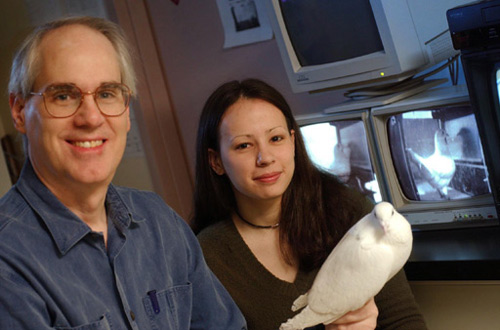Kelley Borradaile (Churchville, Pa.), a junior psychology major, is examining the role of clocks in human behavior by observing pigeons and how they react when time starts organizing their lives.
As an EXCEL Scholar with Robert Allan, associate professor of psychology, Borradaile is investigating the stimulus control of the pigeons’ pecking through the use of a light that brightens as feeding time gets near.
“A lot of human behavior is controlled by clocks,” comments Allan. “We wear them on our arms and position them in buildings. We get upset if they get out of time. This research shows that time translates into behavioral control.”
Describing the experiment, Borradaile says the pigeons are exposed to a “brightness clock” with a key light added to a fixed interval between feedings. The light starts out low and increases in brightness that culminates in the delivery of food. “The behavior of the pigeons comes under stimulus control and emerges in a stereotyped form across subjects,” says the student. “More movement is observed when the light is dim and pecking is observed when the key light brightens. This suggests that the clock stimulus arrangements are effective organizers of behavior.”
Borradaile says the next phase of the experiment will investigate the effect of imposing a consequence on the pigeons to see if their pecking behavior responds to it. When the pigeon pecks on a key, the brightness of the light will be set back and the time of feeding delayed, which has been shown in previous research to reduce the amount of pecking. A further experiment will use a location clock consisting of a computer-generated “dot” stimulus, a dot that will move from left to right, followed by a brief delivery of food.
“The x and y locations of the pigeon’s pecks will be recorded by a touch screen and will allow for the assignment of responses such as those that hit the dot, lead the dot, or lag it,” says Borradaile, adding that a specific number of hits will be required for each food delivery.
Borradaile says she is enjoying EXCEL and is excited to have the opportunity to work with Allan, whose passion and enthusiasm in the area of behavioral science has proven contagious. He is an excellent source of knowledge, she says.
“I was excited for the opportunity to work in the pigeon lab because I didn’t know that such an area of psychology existed or what its implications were,” she says. “Learning about the area has challenged what I had originally planned for my career in psychology, leaving my current plans up in the air.”
“Even though I lost the security of knowing exactly where my life was headed, I’m glad I experienced such opposition in viewpoints,” she adds. “This questioning of beliefs is the essence of learning, and it couldn’t have happened with just a lecture hall and a textbook. I needed the closely knit, personalized approach to academia, which Lafayette fosters, enabling students to develop close relationships with the faculty, which is impossible at larger colleges and universities.”
Allan describes Borradaile as one of the best students he has. The EXCEL research has “led her to understand basic behavior that most of us don’t even think about and to appreciate what animal behavior can tell us about our own. In reality, pigeons are much like humans. We all have evolved on the same planet.”
A graduate of Neshaminy High School, Borradaile is a head counselor in the Dean of Studies Peer Counselor program and a peer tutor.

Using pigeons as test subjects, Kelley Borradaile ’03 and Robert Allan, associate professor of psychology, investigated the effects of clocks on behavior in an EXCEL Scholars project.
